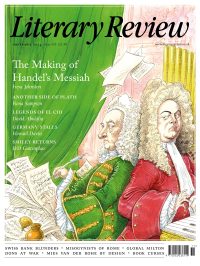Richard Smyth
Bard of Wormingford
Blythe Spirit: The Remarkable Life of Ronald Blythe
By Ian Collins
John Murray 416pp £25
It’s striking, if not startling, to be reminded that Ronald Blythe, the gifted, poised and complacent familiar spirit of the Essex–Suffolk border, was once a favourite of the New York Times, feted in print by John Updike, taken to dinner by Bergman and Bogarde. With his history The Age Of Illusion (1963) and his masterpiece Akenfield (1969), Blythe cracked America before reaching his half-century, with another half-century still to go (he was a hundred when he died in January 2023). Nevertheless, in this rich and enjoyable biography, Ian Collins is still able to assert, convincingly, that Blythe’s ‘own greatness as a writer was to come with great age’.
Blythe’s Word from Wormingford column in the Church Times – discursive, mild, enquiring, endlessly erudite, effortless (or apparently effortless) – began in 1993, when the writer was seventy and already comfortably ensconced on the spot where he was to die, Bottengoms, the crooked, dusty Essex house he inherited from his friends the artist John Nash and his wife, Christine. The publication in 2022 of Next to Nature, a collection of his Word from Wormingford work, was a suitable way for Blythe to mark his century, but as Blythe Spirit shows (a biography of this masterly writer surely deserves a better title) it would be a mistake to think that the mood of bucolic repose on display in the volume was characteristic of his career as a whole – or of Blythe the man.
Blythe was born in a pink-washed Suffolk longhouse in 1923 to a Londoner mother who adored the countryside and a taciturn countryman father, enduringly marked by the Gallipoli catastrophe (Collins more often than not settles on ‘gravedigger’ to characterise Blythe’s father, but that was only one of a number of

Sign Up to our newsletter
Receive free articles, highlights from the archive, news, details of prizes, and much more.@Lit_Review
Follow Literary Review on Twitter
Twitter Feed
Under its longest-serving editor, Graydon Carter, Vanity Fair was that rare thing – a New York society magazine that published serious journalism.
@PeterPeteryork looks at what Carter got right.
Peter York - Deluxe Editions
Peter York: Deluxe Editions - When the Going Was Good: An Editor’s Adventures During the Last Golden Age of Magazines by Graydon Carter
literaryreview.co.uk
Henry James returned to America in 1904 with three objectives: to see his brother William, to deliver a series of lectures on Balzac, and to gather material for a pair of books about modern America.
Peter Rose follows James out west.
Peter Rose - The Restless Analyst
Peter Rose: The Restless Analyst - Henry James Comes Home: Rediscovering America in the Gilded Age by Peter Brooks...
literaryreview.co.uk
Vladimir Putin served his apprenticeship in the KGB toward the end of the Cold War, a period during which Western societies were infiltrated by so-called 'illegals'.
Piers Brendon examines how the culture of Soviet spycraft shaped his thinking.
Piers Brendon - Tinker, Tailor, Sleeper, Troll
Piers Brendon: Tinker, Tailor, Sleeper, Troll - The Illegals: Russia’s Most Audacious Spies and the Plot to Infiltrate the West by Shaun Walker
literaryreview.co.uk